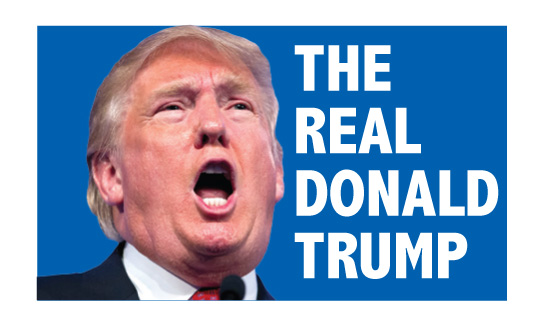Of all the traits that distinguish conservatives from liberals, the most important may be the former’s fidelity to the Constitution. During the presidential primary debates, the Constitution has been mentioned more than fifty times by Republicans and only seven times by Democrats.

Yet the front-runner for the presidential nomination of America’s conservative party is a man who has spent much of the campaign promising to undermine the Constitution.
In just seven months since he entered the presidential race, Trump has proposed policies that are clearly unconstitutional and others that are dubiously so. He has vowed to end birthright citizenship, unilaterally deport millions of illegal immigrants and close down parts of the Internet. He has proposed creating a registry of Muslims living in the U.S. and temporarily barring Muslims entry into the country. Trump has also promised to issue an executive order that would mandate the death penalty for anyone who murders a police officer “as one of the first things I’d do in terms of executive order.”
Trump justifies most of these in the name of security. “We’re going to have to do things that we never did before,” Trump said during a November interview in which he floated the idea of requiring Muslims to obtain national ID cards or be registered in a database. “And some people are going to be upset about it, but I think that now everybody is feeling that security is going to rule. And certain things will be done that we never thought would happen in this country in terms of information and learning about the enemy. And so we’re going to have to do certain things that were frankly unthinkable a year ago.”
At a time of high anxiety over the economy, jobs, and terrorism, Trump’s authoritarian politics may reassure some voters who, with some justification, have lost faith in the federal government’s political will do do its job. But however justified their concerns, Trump should not be the answer for anyone who wants constitutional government.
A ban on Muslims entering the country would probably violate the First Amendment’s ban on the establishment of religion, the Fifth Amendment’s guarantee of due process, and the 14th Amendment’s promise of equal protection.
Donald Trump’s anti-constitutionalism characteristically edges into authoritarianism. This is seen in Trump’s flirtations with Russian President Vladimir Putin, in whom the real estate mogul sees much to admire. Trump has said he would “get along very well” with Putin, whom he has called “an absolute leader” and “a man highly respected within his own country and beyond.” Trump has called meeting the thuggish Kremlin kleptocrat a “great honor.”
When reporters reminded Trump that journalists critical of Putin had been murdered, he said, “He’s running his country, and at least he’s a leader, you know, unlike what we have in this country.”
Trump’s affinity for Putin may explain why a recent analysis of polling data found that the most important variable in predicting whether someone is a Trump supporter is whether they have authoritarian inclinations.
The genius of the founders was to separate powers to limit the expansion of the federal government, and establish checks and balances to restrain the power of each branch, including the executive. President Obama has shown that an overweening executive can make a mockery of the Constitution and the idea of the consent of the governed.
There are many reasons for conservatives to reject Trump’s candidacy. Chief among them is to affirm that the Constitution should never be seen as in impediment to effective democratic governance but rather as the source from which it flows.
